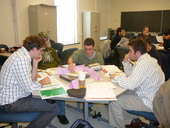Highlight
Problem Based Learning IGERT Course
Achievement/Results
During the winter and spring semester the IGERT students undertook the Solar Hydrogen in Renewable Energy Systems class. This course is one of the first of its kind in graduate education at the University of Delaware as it utilizes Problem Based Learning and develops student’s learning through a variety of different group work activities.
This past semester the students were divided into four groups of five and they had a wide range of team names: Team ‘Symbol’, Team Banana, Simple Green and Team Cake-B. Being interdisciplinary in nature, each group was presented with numerous different problems, all pertaining to renewable energy and solar hydrogen and, in very limited time frames had to either provide written reports or oral presentations.
It was a true highlight for the IGERT to see all the teams working together in a manner that embodies the essence of the IGERT educational philosophy.
The course was the first truly interdisciplinary course developed for the IGERT program. There have been courses that the IGERT students had to register for (Solar Energy Systems, Introduction to Fuel Cells, Economics and Policy and Energy and Sustainability), but this course, in particular, was developed for the IGERT students and the program.
The IGERT strives to develop graduate students that have a completely different graduate experience. In this regard we have focused on making the students very pro-active in their involvement with community outreach projects (as you’ve already read about) and give them a slightly different educational experience. Even though they are here for research purposes, they are also here to work together in interdisciplinary teams so that they can collaborate on different group projects, and essentially publish papers that are interdisciplinary in nature.
In terms of the Problem Based Learning Solar Hydrogen Course, Professor Opila (IGERT PI), Professor Watson (Assistant Dean of Arts and Sciences and on the steering committee for the Institute for Undergraduate Education), Meghan Schulz (our TA and an IGERT Fellow) and Morag Bremner (the IGERT Program Coordinator) planned and created the course.
The course itself was titled as: Solar Hydrogen Systems in Renewable Energy and looked at topics relating to solar hydrogen relating to the generation and use of hydrogen from solar energy sources, particularly photovoltaics and photo-electrochemical systems. The course includes: technical analyses of energy payback, applications of solar hydrogen systems: energy efficiency analysis of hydrogen systems; economics and policy. This course was heavily project based, with students expected to complete several group projects.
Should you like to read more about the course, you can find details on http://www.udel.edu/igert/pbl_course.html. You will be able to have access to the actual power-points and presentations that the different students did.
Being able to develop this course was also made possible through curriculum development funding from NSF.
Address Goals
Developing a course for the IGERT that was interdisciplinary was one of utmost importance for the IGERT program. To this end, the course has enabled us to create something that is viewed as inclusive and able to expand the scientific literacy of all citizens. The groups in the course consisted of students from across multiple disciplines and each one of those students bought their own area of expertise to the group dynamic.
Having such an interdisciplinary mix allowed each student to focus on solving that group’s particular problem by incorporating the strengths of that particular student’s background. In turn, those students who considered themselves less scientifically and technically literate (our Economics and Policy Students) were able to impart knowledge to their peers about the economic and policy considerations that one needed to be aware of when discussing the ins and outs of scientific advancements.
Every single student in the class gave positive feedback about the class and suggested that more graduate courses should operate in this manner. Learning from each other allowed them to realize that sometimes the best learning habits are those where we share and communicate ideas about a common area of interest. Solving problems about international and national hydrogen problems also enabled them to think beyond the limits of the United States and look at solutions for a broader world context.
Research might very well be taking place in the first world, but some of the problems the students tackled had relevance in a third world situation (pertaining to water heaters in Gambia), and they need to think of ways to communicate the science to a third world audience.
On a more local scale, the students examined the realistic and achievable conversion of a local building into a ‘greener’ building. Using real world examples allowed the students to think about the very relevant problems that existed in our present world, and use their skills to offer solutions to them.







